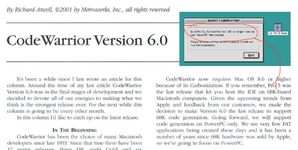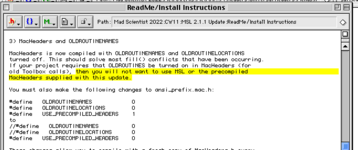David Cook
Well-known member
There are a number of threads on this forum regarding present-day development with Metrowerks CodeWarrior. I have a couple of projects in mind, but first need to select a development environment.
Historically, I began with Lightspeed C on a Mac SE and continued through Symantec C 7.0.5 / 8.0.3 on a Mac IIci. Compiler bugs and slowness caused me to switch over CodeWarrior 7 on a Power Macintosh 6100 in late 1995. My Mac career concluded with CodeWarrior Pro 2 on a Power Macintosh 8500 in late 1997.
As I have the CodeWarrior Pro 2 environment set up from years ago, that would be the easiest answer. My criteria for other CW candidates are:
1. A development environment that other people could replicate for collaboration. So, the original installer and update files should be publicly available.
2. Fewest known bugs/crashes, because we aren't going to get support or updates.
3. C/C++ compiler. The Pascal, Java, and Windows compilers aren't relevant to my needs.
4. Ability to make 68K, PPC, and fat binaries
5. Produces output compatible with System 6.0.7 through 8.1 (last 68040 support). Environment must run on 7.5.5 (last 68000 support) and 8.1 (HFS+ nice for SSDs).
6. Environment runs on Basilisk, Quadra 630/650, Power Macintosh 7300.
Candidates:
CodeWarrior Pro 5: Disqualified because it doesn't run on 68K Macs. Wikipedia says it is compatible by reference to this 2001 article.
But, trying to run the CW 5 IDE (which is poorly named 4.0) let's you know the installer was not joking. Mingling the old IDE with the new compiler might work, but I feel like there needs to be a compelling reason to ask people to hybridize.

CodeWarrior Pro 4: CD ISO is available. The updates are available as part of the massive FTP dump.
After downloading the 5 GB file, you'll need to use a tool like 7-Zip to extract the archive, as Windows thinks the zip is corrupt due to overflowing the 32-bit limit. For those interested, I pulled the update files for the C/C++ compiler and uploaded those to the repository.
After updating, you need to recompile the MSL libraries. Unfortunately, this is where I discovered that the PowerPC portion apparently doesn't compile on 68K hardware or an emulator. I tried Basilisk, Quadra 630, and a Quadra 650 on System 7.5.5 and System 8.1 (even with minimal extensions and with virtual memory on/off) without luck. However, booting from that same drive on a Power Macintosh 7300 compiled everything just fine.
That caused me to test compiling my old programs under the same conditions. Shockingly, the PPC compiler crashes or produces an 'internal error' on 68K machines, but works on the Power Macintosh. I tried CodeWarrior Pro 2 with my own programs, and it also won't successfully compile on a 68K machine (but will on the Power Macintosh). In contrast, compiling the same code but for 68K binaries works in all environments.
At some point, did the Metrowerks team just assume all developers switched over to PowerPC machines for PPC and Fat compiles? How far back do I need to go to find a version of CodeWarrior that outputs PPC binaries on a 68K platform?
CodeWarrior Pro 3: CD ISO is available. The updates are available as part of the massive FTP dump. Haven't tested.
CodeWarrior Pro 2: CD ISO is available. The updates are available as part of the massive FTP dump. Crashes when compiling my PPC code on 68K machines.
CodeWarrior Pro 1: CD ISO and updates available. Another thread suggested people standardized on this release. Does anyone know why?
At this point, I am open to suggestions. Does anyone have any reasoning behind using a particular version (like fewer bugs or improved IDE or nice C extensions)?
Historically, I began with Lightspeed C on a Mac SE and continued through Symantec C 7.0.5 / 8.0.3 on a Mac IIci. Compiler bugs and slowness caused me to switch over CodeWarrior 7 on a Power Macintosh 6100 in late 1995. My Mac career concluded with CodeWarrior Pro 2 on a Power Macintosh 8500 in late 1997.
As I have the CodeWarrior Pro 2 environment set up from years ago, that would be the easiest answer. My criteria for other CW candidates are:
1. A development environment that other people could replicate for collaboration. So, the original installer and update files should be publicly available.
2. Fewest known bugs/crashes, because we aren't going to get support or updates.
3. C/C++ compiler. The Pascal, Java, and Windows compilers aren't relevant to my needs.
4. Ability to make 68K, PPC, and fat binaries
5. Produces output compatible with System 6.0.7 through 8.1 (last 68040 support). Environment must run on 7.5.5 (last 68000 support) and 8.1 (HFS+ nice for SSDs).
6. Environment runs on Basilisk, Quadra 630/650, Power Macintosh 7300.
Candidates:
CodeWarrior Pro 5: Disqualified because it doesn't run on 68K Macs. Wikipedia says it is compatible by reference to this 2001 article.

But, trying to run the CW 5 IDE (which is poorly named 4.0) let's you know the installer was not joking. Mingling the old IDE with the new compiler might work, but I feel like there needs to be a compelling reason to ask people to hybridize.

CodeWarrior Pro 4: CD ISO is available. The updates are available as part of the massive FTP dump.
Metrowerks Updates FTP Archive - Macintosh Repository
Metrowerks Updates FTP Archive (Mac abandonware from 2004)
www.macintoshrepository.org
After downloading the 5 GB file, you'll need to use a tool like 7-Zip to extract the archive, as Windows thinks the zip is corrupt due to overflowing the 32-bit limit. For those interested, I pulled the update files for the C/C++ compiler and uploaded those to the repository.
Metrowerks CodeWarrior Pro 4 Update 4.1 for Mac C/C++ - Macintosh Repository
Macintosh IDE, C/C++ compiler, PPC linker, and Find File updates extracted from the massive "Metrowerks Updates FTP Archive" found...
www.macintoshrepository.org
After updating, you need to recompile the MSL libraries. Unfortunately, this is where I discovered that the PowerPC portion apparently doesn't compile on 68K hardware or an emulator. I tried Basilisk, Quadra 630, and a Quadra 650 on System 7.5.5 and System 8.1 (even with minimal extensions and with virtual memory on/off) without luck. However, booting from that same drive on a Power Macintosh 7300 compiled everything just fine.
That caused me to test compiling my old programs under the same conditions. Shockingly, the PPC compiler crashes or produces an 'internal error' on 68K machines, but works on the Power Macintosh. I tried CodeWarrior Pro 2 with my own programs, and it also won't successfully compile on a 68K machine (but will on the Power Macintosh). In contrast, compiling the same code but for 68K binaries works in all environments.
At some point, did the Metrowerks team just assume all developers switched over to PowerPC machines for PPC and Fat compiles? How far back do I need to go to find a version of CodeWarrior that outputs PPC binaries on a 68K platform?
CodeWarrior Pro 3: CD ISO is available. The updates are available as part of the massive FTP dump. Haven't tested.
CodeWarrior Pro 2: CD ISO is available. The updates are available as part of the massive FTP dump. Crashes when compiling my PPC code on 68K machines.
CodeWarrior Pro 1: CD ISO and updates available. Another thread suggested people standardized on this release. Does anyone know why?
At this point, I am open to suggestions. Does anyone have any reasoning behind using a particular version (like fewer bugs or improved IDE or nice C extensions)?



